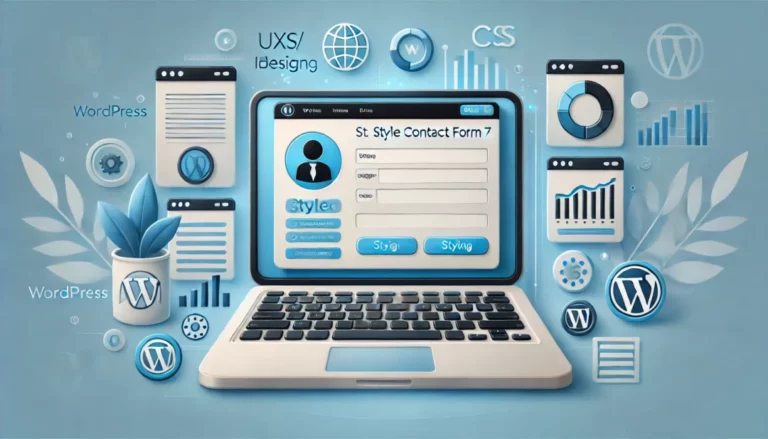
Key Factors to Consider:
- Business Alignment: Choose a theme tailored to your industry and audience needs.
- Free vs. Premium: Free themes are budget-friendly but limited; premium themes offer advanced features, customization, and support.
- Responsive Design: Ensure mobile compatibility for optimal user experience and SEO.
- SEO and Speed: Look for themes optimized for search rankings and fast loading times.
- Customization Options: Opt for themes with robust customization tools or drag-and-drop page builders.
- Security and Updates: Select themes from reputable developers with regular updates.
- Customer Support: Choose themes with strong documentation and responsive support.
Top Theme Suggestions:
- Small Businesses: Astra, OceanWP, Divi.
- E-commerce: Flatsome, Metro, Hongo.
- Service-Based Businesses: Business Lounge, GrowthPress, Consulting WP.
- Restaurants/Food: Rosa 2, Grand Restaurant, Foodica.
Choosing the right WordPress theme for your business is crucial. It can make or break your online presence.
But with thousands of themes available, how do you pick the perfect one?
This guide will help you navigate the sea of WordPress themes. It will provide you with the knowledge to make an informed decision.
WordPress themes are more than just aesthetics. They can impact your website’s functionality, user experience, and even SEO.
Free or premium? This is a common dilemma when choosing a WordPress theme. Both have their pros and cons, which we will discuss in detail.
A responsive design is no longer optional. With the rise of mobile browsing, your theme must look good and function well on all devices.
Customization is another key factor. The ability to tweak your theme to match your brand can set you apart from the competition.
Speed and performance are also critical. A slow-loading website can drive away potential customers and hurt your search engine rankings.
Security should never be overlooked. Choosing a theme from a reputable developer with regular updates can protect your site from potential threats.
Lastly, good customer support and comprehensive documentation can save you a lot of time and frustration.
Whether you’re a small business, a restaurant, or a consulting firm, there’s a WordPress theme out there for you. We’ll guide you through the best options for various business types.
So, are you ready to find the perfect WordPress theme for your business? Let’s dive in.
Understanding WordPress Themes
WordPress themes are the backbone of your site’s design. They determine how your website looks and behaves.
Each theme comes with a set of templates and styles. These dictate the appearance of different pages on your site.
More than just visuals, themes impact user experience. A good theme can enhance engagement and retention.
Themes also play a role in search engine rankings. Clean, fast, and responsive themes can improve your SEO.
When choosing a theme, consider how it aligns with your business goals. It should reflect your brand’s voice and values.
The Difference Between Free and Premium Themes
Free WordPress themes are accessible to everyone. They offer basic features with limited customization options.
On the other hand, premium themes come with a price tag. They provide advanced features and enhanced customization.
Free themes are perfect for budget-conscious businesses. However, they might lack the uniqueness and support of premium ones.
Premium themes often include customer support and regular updates. This ensures your site stays secure and functional over time.
Evaluating Theme Responsiveness and Mobile Compatibility
Responsive design is critical in today’s digital world. Your site should look great on all devices.
A responsive WordPress theme adapts to various screen sizes. This ensures users have a seamless experience.
Mobile compatibility affects your site’s usability and rankings. Google favors mobile-friendly sites in its search results.
Test themes across different devices before making a decision. This will help you choose a design that works everywhere.
Importance of SEO-Friendly Themes
SEO-friendly themes can boost your search engine visibility. They have clean code and are optimized for speed.
Such themes often include features like meta tags and schema markup. These enhance your site’s discoverability.
Loading speed is vital for SEO. Fast-loading themes reduce bounce rates and improve user engagement.
Before selecting a theme, check its SEO capabilities. Choose one that has built-in SEO features or is optimized for search engines.
Key Features to Look for in a Business WordPress Theme
Choosing the right WordPress theme is crucial for business success. It must complement your brand and meet functional needs.
Several key features are essential in a WordPress business theme. These features enhance the user experience and boost site performance.
A suitable theme should offer customization options. This allows you to tailor the site to your business identity.
Feature-rich themes often integrate with page builders. This makes designing unique layouts easy and intuitive.
Look for themes that include the following:
- Responsive design for all devices
- Built-in SEO optimization
- Fast loading speeds for low bounce rates
- Reliable customer support and regular updates
- Compatibility with essential plugins
Customization Options and Page Builders
Customization is vital to make your website unique. Themes with extensive customization options offer flexibility.
Many business themes come with built-in page builders. These tools allow you to create custom layouts without coding.
Drag-and-drop builders simplify the design process. They let you visualize changes in real time and adjust with ease.
Choose a theme with a robust page builder. It empowers you to create a site that reflects your brand.
Speed and Performance: The Need for Fast Loading Themes
Site speed directly affects user experience. Slow sites lead to higher bounce rates and lower engagement.
Fast loading times contribute to better search engine rankings. Google prioritizes sites with optimal performance.
A theme optimized for speed can greatly benefit your site. Look for themes that are lightweight and well-coded.
Page speed tests can help you evaluate themes. Select a theme that performs well in these assessments.
Security and Regular Updates
In today’s digital landscape, security is a top priority. A secure theme protects your site from threats.
Themes that receive regular updates are more reliable. Updates ensure compatibility with the latest WordPress version.
Check if the theme offers built-in security features. This includes options like security headers and CAPTCHA forms.
Opt for themes with a strong update history. They are more likely to address security vulnerabilities promptly.
Support and Documentation
Good support is vital for theme users. It helps resolve issues quickly and maintains site functionality.
Themes with comprehensive documentation simplify the setup process. They provide clear instructions and troubleshooting tips.
Consider themes that offer dedicated customer support. This can be via email, forums, or live chat.
Read user reviews to gauge the quality of support. A responsive support team can be invaluable for your business site.
Choosing Themes for Different Business Types
Selecting a WordPress theme depends on your business type. Each niche has unique needs and audience expectations. Consider these factors when choosing a theme for your business.
Themes can enhance the user experience by catering to specific industries. For instance, a restaurant theme might highlight menu integration. Choose a theme that aligns with your business goals.
It’s crucial to evaluate the features offered by a theme. Ensure it meets the core requirements of your business operations.
Some themes are versatile and suit various businesses. Others are specialized and cater to distinct niches. Choosing the right fit can amplify your online impact.
Understanding the characteristics of industry-specific themes leads to better decisions. Let’s explore popular themes for different business types below.
Best WordPress Themes for Small Business
Small businesses often require themes that offer simplicity and usability. A clean design is crucial to showcase your services effectively. It avoids overwhelming potential customers.
Small business themes should be responsive. They need to look great across all devices. This is crucial for reaching mobile users.
Budget is often a concern for small businesses. Free or inexpensive themes offer sufficient capabilities without heavy investment.
Opt for themes with essential features like contact forms. They support customer engagement and generate leads effectively.
Divi
- Description: A versatile and popular multipurpose theme with a robust visual drag-and-drop builder, suitable for various business types.
- Pros:
- Highly customizable with numerous pre-built layouts.
- User-friendly interface suitable for beginners.
- Responsive design ensures compatibility across devices.
- Cons:
- Can be overwhelming due to the abundance of features.
- Premium pricing may not suit all budgets.
Astra
- Description: A lightweight and fast theme offering deep integration with popular page builders, ideal for small businesses seeking performance and flexibility.
- Pros:
- Optimized for speed and performance.
- Extensive library of starter templates.
- Highly customizable with no coding required.
- Cons:
- Some advanced features require premium add-ons.
- Initial setup may require time to understand all options.
OceanWP
- Description: An incredibly fast and customizable theme that can help create any type of website, great for small business WordPress websites.
- Pros:
- Supports popular page builders for easy design.
- WooCommerce integration for e-commerce capabilities.
- Fully responsive and SEO-friendly.
- Cons:
- Certain extensions require payment.
- Customization options may be extensive for beginners.
WordPress Themes for E-commerce Businesses
E-commerce themes are tailored for online stores. They include shop essentials like product displays and shopping carts.
Look for themes with WooCommerce integration. It’s a popular plugin that enables easy store management.
Visual appeal is vital in e-commerce. Themes with high-quality design and images attract customers.
Performance is crucial for conversion rates. Ensure your theme is optimized for speed to avoid losing buyers.
Flatsome
- Description: A highly customizable and responsive theme designed specifically for WooCommerce, suitable for creating professional online stores.
- Pros:
- Built-in drag-and-drop page builder.
- Regular updates and extensive documentation.
- Optimized for speed and SEO.
- Cons:
- Premium pricing may be a consideration.
- Learning curve for beginners due to numerous features.
Metro
- Description: A minimalist WooCommerce theme offering multiple pre-built homepage layouts, supporting both Elementor and Gutenberg for customization.
- Pros:
- Clean and modern design suitable for various products.
- Compatible with popular SEO and translation plugins.
- Includes premium plugins like Layer Slider.
- Cons:
- Limited built-in advanced features; may require additional plugins.
- Customization may require familiarity with page builders.
Hongo
- Description: A modern and feature-rich WooCommerce theme offering multiple store demos and templates, suitable for various e-commerce websites.
- Pros:
- Highly customizable with WPBakery page builder.
- Superfast performance with animation effects.
- Includes extra plugins like MailChimp and Slider Revolution.
- Cons:
- Premium theme with associated costs.
- May require time to explore all customization options.
Themes for Service-Based Businesses
Service-based businesses require themes that are informative and easy to navigate. Key information should be accessible to potential clients quickly.
Themes should emphasize service listings and contact options. These features help convert visitors into clients.
Choose themes with testimonial sections. They build credibility and trust with prospective clients.
An integrated booking system is beneficial for managing appointments. It streamlines the client interaction process.
Business Lounge
- Description: A theme designed for service businesses, offering multiple header and footer layouts, suitable for consulting firms and professional services.
- Pros:
- Customizable with various layouts and design options.
- Includes landing page templates for marketing campaigns.
- Responsive design ensures compatibility across devices.
- Cons:
- Premium pricing may be a consideration.
- May require time to set up and customize fully.
GrowthPress
- Description: A theme tailored for marketing agencies and consultancies, featuring vibrant colors and precise typography to create a premium feel.
- Pros:
- Includes customizable pricing tables and email opt-in forms.
- Built-in landing page options for PPC campaigns.
- Responsive and SEO-friendly design.
- Cons:
- Limited to service-based businesses; may not suit other niches.
- Premium theme with associated costs.
Ascendio
- Description: A simple and aesthetic theme capable of serving various service niches, offering multiple header and footer layouts and Ecwid compatibility.
- Pros:
- Customizable with a variety of layouts and design options.
- Compatible with e-commerce plugins for online payments.
- Responsive design ensures compatibility across devices.
- Cons:
- May require time to set up and customize fully.
- Premium pricing may be a bit off
Themes for Food Businesses and Restaurants
For food businesses, themes should highlight menus and locations. These features help customers make dining decisions.
Themes with reservation systems enhance the user experience. They allow users to book tables directly through the site.
Visual appeal is significant in attracting customers. Themes should be image-rich, showcasing dishes in an appetizing manner.
Social media integration is advantageous. It helps users share their dining experiences and attracts more visitors.
Rosa 2
- Description: A beautifully crafted theme for restaurants, cafes, and bakeries, featuring parallax scrolling and built-in menu management.
- Pros:
- Elegant design with parallax effects for a premium feel.
- Easy-to-use food menu functionality.
- Supports online reservations and WooCommerce for online orders.
- Cons:
- Limited to food and beverage businesses.
- Premium pricing may not suit small startups.
Grand Restaurant
- Description: A responsive theme designed for restaurants, food bloggers, and caterers, offering multiple demos and layouts.
- Pros:
- Built-in support for reservation systems.
- Compatible with WooCommerce for online food orders.
- Pre-built demos for quick setup.
- Cons:
- May require some customization to fit unique branding.
- Advanced features require additional plugins.
Foodica
- Description: A food-oriented theme perfect for food bloggers and restaurant websites, with a clean and minimalistic design.
- Pros:
- Optimized for food-related content and recipes.
- Supports WooCommerce for selling products or meal kits.
- Comes with featured slider and recipe index features.
- Cons:
- Limited flexibility outside the food niche.
- Some customization options may require coding knowledge.
Themes for Consulting and Coaching Businesses
Consulting businesses benefit from themes that emphasize professionalism. A polished design reflects a high standard of service.
Themes should include sections for showcasing credentials and past successes. This builds client trust and demonstrates expertise.
Choose themes that facilitate client interaction, such as scheduling appointments or consultations. These features streamline client engagements.
Social proof is powerful in this industry. Opt for themes that easily display testimonials and case studies. They emphasize your ability to deliver results.
Divi Consultant
- Description: A specialized version of the popular Divi theme tailored for consulting and coaching businesses, offering a sleek and professional layout.
- Pros:
- Drag-and-drop builder for easy customization.
- Pre-built templates for consulting services.
- Integrated call-to-action (CTA) sections to convert leads.
- Cons:
- Requires some effort to learn the Divi builder.
- Premium pricing may not suit all budgets.
Consulting WP
- Description: A theme designed for consultants, financial advisors, and corporate professionals, featuring interactive charts and appointment booking.
- Pros:
- Pre-designed layouts for various consulting niches.
- Built-in tools for financial and data visualization.
- SEO and speed optimized for better performance.
- Cons:
- Limited appeal outside consulting-related industries.
- Some features might require premium add-ons.
CoachPress
- Description: A theme crafted for coaches, mentors, and consultants, offering blog layouts and lead-generation tools.
- Pros:
- Optimized for personal branding and content sharing.
- Includes CTA buttons and email opt-in forms.
- Responsive design with fast loading times.
- Cons:
- Focused more on individual consultants than larger firms.
- Advanced customization may need premium features.
How to Assess the Reliability of Theme Developers
When selecting a WordPress theme, it’s vital to assess the theme developer’s reliability. A reputable developer ensures you receive a high-quality product with regular updates. This is crucial for maintaining your website’s functionality and security.
Start by researching the developer’s history. A seasoned developer with a portfolio of successful themes is a good sign. It’s also helpful to check their involvement in the WordPress community. Active contributions often indicate a developer’s commitment to the platform.
Another consideration is the level of support offered. Reliable developers provide comprehensive support, guiding users through theme issues. They also offer detailed documentation, which simplifies the customization process.
Lastly, examine the security measures that developers implement. A reliable developer prioritizes security, protecting your website from vulnerabilities. A secure theme is indispensable for maintaining user trust and data integrity.
User Reviews and Ratings
User reviews and ratings offer insights into a theme’s performance and the developer’s reliability. Feedback from other users highlights both strengths and potential drawbacks. Reviews can reveal common issues or praises that may align with your priorities.
It’s important to look at reviews across multiple platforms. Checking different sources provides a well-rounded view of the theme’s reputation. This approach ensures you’re not relying solely on testimonials hosted on the developer’s website, which can be biased.
Pay attention to how developers respond to negative reviews. A quick and effective response showcases a developer’s commitment to user satisfaction. It also reflects their willingness to improve and address user concerns.
Update History and Developer Responsiveness
A theme’s update history can tell you a lot about its future viability. Frequent updates indicate a developer committed to improving and maintaining their product. This ensures compatibility with the latest WordPress versions and helps to incorporate new features.
Evaluate how developers respond to change requests or bug reports. Prompt responses reflect a proactive attitude towards user needs. Responsiveness is a positive indicator of how well they manage ongoing theme development.
A lack of regular updates can be problematic. Outdated themes may leave your website vulnerable to security threats or lack important functionalities. Hence, a good update history is essential for confidence in your theme’s longevity.
Implementing Your Theme: Tips and Best Practices
Implementing a WordPress theme requires careful planning and execution. To start, ensure you backup your site. This protects your existing data if anything goes wrong during implementation.
Next, it’s important to work in a staging environment. This setting allows you to test changes privately without affecting the live site. It helps catch errors before they impact visitors.
Pay attention to theme setup instructions. Follow the guidelines from developers to make sure all features function correctly. This often involves importing demo content and configuring settings.
Here’s a checklist to guide you:
- Backup your existing site.
- Use a staging environment.
- Follow setup instructions.
- Customize elements to fit your brand.
- Test your site before going live.
Once setup is complete, refine your site’s design and functionality. Customize content, layouts, and colors to align with your brand identity. Ensure the theme meets your business needs and presents a professional image.
Before launching, test the site thoroughly. Check on various devices and browsers. This step confirms that the user experience remains seamless across platforms.
Customizing Your Theme Safely with Child Themes
Customization plays a key role in your site’s uniqueness. However, direct changes to the parent theme can be risky. Updates to the main theme can override your custom changes.
Child themes are a solution. They allow you to customize your website without altering the parent theme’s code. This ensures that your modifications remain intact even after updates.
Creating a child theme involves adding a separate styles.css file. This file can override the parent theme’s styles. This approach ensures a clean and organized customization process.
Lastly, consider keeping a log of your changes. Documentation helps track modifications and troubleshoot issues in the future. It also assists others who might work on your site.
Ensuring Plugin Compatibility
WordPress plugins enhance functionality but must align with your theme. Compatibility issues can arise, impacting site performance. Thus, ensuring plugin compatibility is crucial during implementation.
Before installing a plugin, check if it’s compatible with your theme. Many developers specify compatible plugins in theme documentation. Such details aid in maintaining a seamless website experience.
Testing plugins in a staging environment is wise. This minimizes the risk of conflicts on your live site. It also allows you to identify and resolve issues without affecting users.
Regular plugin updates also matter. Ensure both your plugins and theme are up-to-date. This practice maintains site stability and security.
Translation and Multilingual Readiness
A multilingual website reaches a broader audience. Thus, your theme’s translation readiness is vital for expanding market reach. Not all themes offer multilingual support, so this should be a consideration from the start.
Translation-ready themes include language files that can be easily translated. They support translation plugins, enabling smooth language transitions.
Using plugins like WPML or Polylang can aid in this process. These tools provide the framework for creating a multilingual site. Choose a plugin based on your specific needs and theme compatibility.
Finally, review translations for accuracy. Ensure content maintains consistency in tone and context across languages. This ensures your message resonates with various audiences effectively.
Conclusion: Making the Final Decision
Choosing the right WordPress theme is a pivotal step in building your business website. A well-chosen theme enhances user experience, supports SEO, and aligns with your brand’s identity. It is crucial to invest time in this decision-making process.
Start by clearly defining your business needs and goals. This clarity helps narrow down themes that suit your specific industry. Consider all aspects, from design to functionality, that will impact your users’ experience.
Evaluate both free and premium options. Each has its advantages, but a premium theme often offers more robust features and support. Balance your budget and needs to find the right fit.
Testing is vital before the final launch. Utilize staging environments and user feedback to refine your choices. This step ensures your site performs well across devices and browsers.
In conclusion, the theme you select can greatly influence your business’s online presence. Taking the time to make an informed choice will support your company’s growth and success in the digital space. Embrace a theme that not only meets current demands but can also scale with future innovations.



